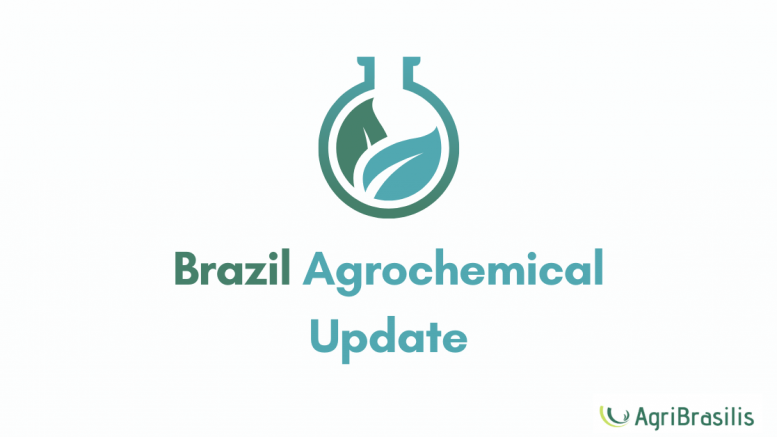Fertilizer and Pesticide News in Brazil
- AgroGalaxy has a 144% increase in input orders (seeds, pesticides and fertilizers) in the first quarter, reaching about US$ 680 million. (AgroGalaxy)
- Espírito Santo Agricultural and Forestry Defense Institute warns of ban in the use of pesticides in urban areas. Fines for those who break the rules can reach around US$ 5.6 thousand. Alert was made after complaints of irregular applications. (Idaf)
- SoluBio invests around U$ 20 million in a new bio-input factory, located in the State of Goiás. (SoluBio)
- Abitrigo updates Farmer’s Booklet about the use of pesticides in wheat cultivation. Update includes information on active ingredients authorized for use in wheat, concepts of risk analysis, general guidelines for monitoring carried out by the National Health Surveillance System and on laboratories that perform pesticide residue analysis on wheat in Brazil and Argentina. (Abitrigo)
- Verde Agritech announces an investment of around US$ 55 million to build its third chlorine-free potash production unit in Brazil after 2023. With the new plant, company expects to be able to supply 16.4% of the national potash demand. (Verde Agritech)
- Use of the neonicotinoid insecticide imidacloprid can put native bees at risk, even at low concentrations, according to studies conducted by Federal University of São Carlos and São Paulo State University. (Unesp; UFSCar)
- First potash mine in the Midwest, in Montes Claros de Goiás, starts operating. Edem Agrominerais plant has a production capacity of over 100 thousand tons. (Edem Agrominerais)
- Sulfuric acid, used in the production chain of fertilizers, had its import rate reduced to zero. Technical mancozeb fungicide had import tax reduced from 12.6% to 4%. (Chamber of Foreign Commerce)
- Renato Arantes will be the new CEO of Rizobacter do Brasil. The executive has already held command positions in companies such as Albaugh and Bayer. (Rizobacter)
- Agricultural pesticides industry already negotiated 65% of national demand for pesticide imports for the 2022/23 harvest. Concerns about logistical bottlenecks due to lockdowns in China increased contracts, which are around 10 to 15% earlier than in previous years. (Sindiveg)
- In compliance with court decision, Anvisa approves toxicological evaluation of triclopyr-butyl 480 g/L EC pesticide from Sumitomo. (Anvisa)
- Brazil and China negotiate mutual recognition of pesticide registration data, aiming to exchange information and technical cooperation on registration regulation in both countries. Memorandum of Understanding between Brazil and China has not yet been signed. (Ministry of Agriculture)
- Fiocruz demands transparency in the dissemination of information on pesticides. According to Luis Carlos Meirelles, president of the foundation, the country needs to invest in technologies that reduce the use of pesticides in order to follow the guidelines of the UN Human Rights Council. (Oswaldo Cruz Foundation)
- Syngenta obtains first registration of a fungicide to control cocoa monoliasis, caused by the fungus Moniliophthora roreri. Approved by the Ministry of Agriculture changes in use recommendations for the fungicide Amistar Top. (Syngenta)
- Public defender Marcelo Novaes denounces in the Legislative Assembly of São Paulo that water quality tests in the state do not monitor 97% of the most used agricultural pesticides in the region and do not include the 20 most used products in sugarcane. Novaes bases his claims on the work of professors at the Federal University of Santa Catarina, who analyze maps of aerial spraying in São Paulo. (São Paulo Forum to Combat Impacts of Pesticides and GMOs)
- Senator Acir Gurgacz requests a public consultation to discuss the impacts of Pesticide Bill No. 6299 with the following participants: Caio Carnonari (UNESP); Paulo Amaral (Brazilian Association of Cotton Producers), Reginaldo Minaré (Brazilian Confederation of Agriculture and Livestock); Angelo Zanaga Trape (UNICAMP). (Federal Senate)
READ MORE PESTICIDE NEWS IN BRAZIL:

